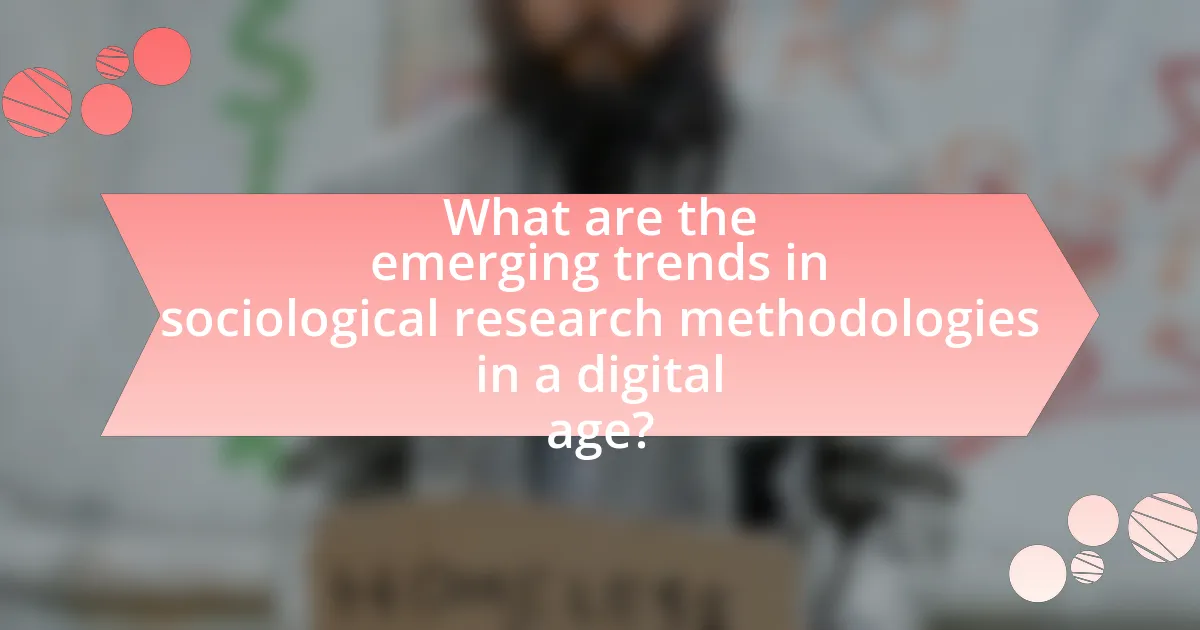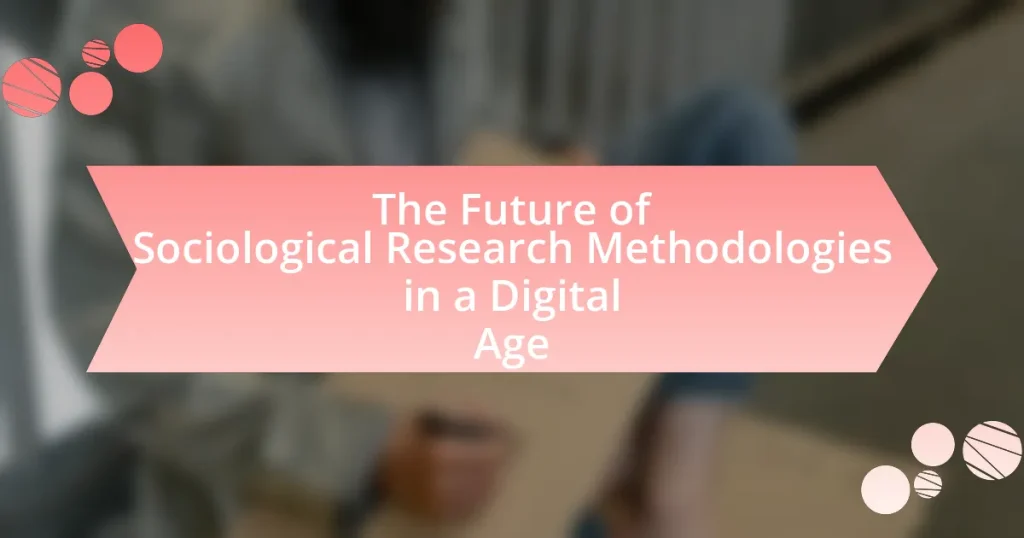The article examines the evolving landscape of sociological research methodologies in the context of a digital age, highlighting key trends such as the use of big data analytics, online ethnography, and mixed-method approaches. It discusses how technology reshapes traditional methods, the integration of digital tools for data collection and analysis, and the challenges sociologists face, including data privacy and the digital divide. Additionally, the article explores the impact of artificial intelligence on research practices, the ethical considerations of digital data collection, and strategies for enhancing participant engagement in studies. Overall, it provides a comprehensive overview of how sociological research is adapting to the demands and opportunities presented by digital technologies.

What are the emerging trends in sociological research methodologies in a digital age?
Emerging trends in sociological research methodologies in a digital age include the increased use of big data analytics, online ethnography, and mixed-method approaches. Big data analytics allows researchers to analyze vast amounts of data from social media, online interactions, and other digital platforms, providing insights into social behaviors and trends. Online ethnography enables sociologists to study communities and cultures in their natural digital environments, offering a more nuanced understanding of social dynamics. Mixed-method approaches combine qualitative and quantitative data, enhancing the depth and breadth of sociological inquiries. These methodologies reflect the growing importance of digital tools and platforms in understanding contemporary social phenomena.
How is technology reshaping traditional sociological research methods?
Technology is reshaping traditional sociological research methods by enabling the collection and analysis of vast amounts of data through digital platforms. This shift allows researchers to utilize tools such as social media analytics, online surveys, and big data analysis, which enhance the scope and scale of research. For instance, a study published in the “American Journal of Sociology” highlights how social media platforms provide real-time insights into social behaviors and trends, allowing sociologists to analyze interactions on a larger scale than traditional methods permit. Additionally, the use of machine learning algorithms facilitates the identification of patterns within complex datasets, further enriching sociological inquiry.
What digital tools are being integrated into sociological research?
Digital tools integrated into sociological research include data analytics software, social media analysis platforms, and geographic information systems (GIS). Data analytics software, such as R and Python, enables researchers to analyze large datasets efficiently, while social media analysis platforms like NVivo and NodeXL facilitate the examination of online interactions and sentiments. Geographic information systems allow for spatial analysis of social phenomena, enhancing the understanding of demographic trends and patterns. These tools collectively improve the accuracy and depth of sociological insights, as evidenced by studies that demonstrate their effectiveness in analyzing complex social dynamics.
How do these tools enhance data collection and analysis?
These tools enhance data collection and analysis by automating processes, increasing accuracy, and enabling real-time insights. Automation reduces human error and speeds up data gathering, allowing researchers to focus on interpretation rather than manual tasks. Increased accuracy is achieved through advanced algorithms that filter and analyze large datasets, ensuring reliable results. Real-time insights facilitate immediate decision-making and adaptive research strategies, which are crucial in a rapidly changing digital landscape. For instance, tools like machine learning algorithms can analyze social media data to identify trends, providing sociologists with timely information that reflects current societal dynamics.
What challenges do sociologists face in adapting to digital methodologies?
Sociologists face several challenges in adapting to digital methodologies, including issues of data privacy, the digital divide, and the need for new analytical skills. Data privacy concerns arise as sociologists must navigate ethical considerations when collecting and analyzing personal information from digital platforms. The digital divide presents a challenge as not all populations have equal access to technology, potentially skewing research findings and limiting the representativeness of data. Additionally, sociologists must acquire new analytical skills to effectively interpret large datasets generated by digital tools, which often require familiarity with advanced statistical methods and software. These challenges highlight the complexities sociologists encounter in integrating digital methodologies into their research practices.
How does data privacy impact sociological research in a digital context?
Data privacy significantly impacts sociological research in a digital context by limiting access to personal data, which is essential for understanding social behaviors and trends. Researchers face challenges in obtaining consent and ensuring confidentiality, which can lead to incomplete datasets and hinder the validity of findings. For instance, the General Data Protection Regulation (GDPR) in Europe imposes strict guidelines on data collection and usage, compelling researchers to adopt more ethical practices while potentially restricting the scope of their studies. This regulatory environment necessitates innovative methodologies that prioritize privacy, such as anonymization techniques and the use of aggregated data, which can alter traditional research approaches and outcomes.
What ethical considerations arise with digital data collection?
Ethical considerations in digital data collection include privacy, consent, and data security. Privacy concerns arise as individuals may not be aware of how their data is being collected, used, or shared, leading to potential violations of personal autonomy. Consent is critical, as researchers must ensure that participants are fully informed about the data collection process and agree to it voluntarily. Data security is also paramount; researchers must implement robust measures to protect sensitive information from unauthorized access or breaches. According to a 2020 report by the American Psychological Association, 70% of individuals express concern about their data privacy, highlighting the importance of ethical practices in digital data collection.

How are qualitative and quantitative methods evolving in the digital landscape?
Qualitative and quantitative methods are evolving in the digital landscape through the integration of advanced technologies and data analytics. Qualitative research is increasingly utilizing online platforms for data collection, such as social media and virtual focus groups, allowing researchers to gather diverse perspectives in real-time. Quantitative methods are benefiting from big data analytics, enabling the analysis of large datasets to identify trends and patterns that were previously difficult to discern. For instance, a study by the Pew Research Center in 2021 highlighted that 79% of researchers now use digital tools for data collection, demonstrating a significant shift towards digital methodologies. This evolution enhances the accuracy and efficiency of sociological research, making it more relevant in a rapidly changing digital environment.
What role does big data play in sociological research?
Big data plays a crucial role in sociological research by enabling the analysis of vast amounts of information to identify patterns, trends, and correlations within social phenomena. This capability allows sociologists to examine complex social behaviors and interactions on a scale previously unattainable, facilitating insights into issues such as public health, migration, and social inequality. For instance, a study published in the journal “Sociological Methods & Research” by Lazer et al. (2014) highlights how big data can enhance traditional sociological methods by providing real-time data that reflects societal changes, thereby improving the accuracy and relevance of sociological findings.
How can sociologists effectively analyze big data?
Sociologists can effectively analyze big data by employing advanced computational techniques and statistical methods to extract meaningful patterns and insights. These techniques include machine learning algorithms, natural language processing, and network analysis, which allow sociologists to handle large datasets that traditional methods cannot manage. For instance, a study by Lazer et al. (2009) in “Science” demonstrated how social media data can be analyzed to understand public opinion trends, showcasing the potential of big data in sociological research. By integrating these methodologies, sociologists can enhance their understanding of social phenomena in a digital age.
What are the limitations of big data in sociological studies?
Big data in sociological studies has several limitations, including issues of representativeness, data quality, and ethical concerns. The representativeness of big data can be skewed, as it often reflects the behaviors and characteristics of specific populations, such as internet users, which may not accurately represent the broader society. Data quality is another significant limitation; big data can contain inaccuracies, biases, or incomplete information, which can lead to misleading conclusions. Ethical concerns arise from privacy issues and the potential misuse of data, as individuals may not consent to their information being used for research purposes. These limitations highlight the challenges researchers face when relying solely on big data for sociological insights.
How is qualitative research adapting to digital platforms?
Qualitative research is adapting to digital platforms by utilizing online tools for data collection, such as social media, virtual interviews, and digital ethnography. These methods allow researchers to reach diverse populations and gather rich, contextual data in real-time. For instance, studies have shown that platforms like Zoom and Skype facilitate in-depth interviews, while social media analysis provides insights into public sentiment and behavior. This shift not only enhances accessibility but also enables researchers to analyze larger datasets efficiently, reflecting the evolving landscape of sociological research methodologies in a digital age.
What new qualitative methods are emerging in online environments?
New qualitative methods emerging in online environments include digital ethnography, online focus groups, and social media analysis. Digital ethnography allows researchers to immerse themselves in online communities, observing interactions and cultural practices in real-time. Online focus groups leverage video conferencing tools to facilitate discussions among participants from diverse geographical locations, enhancing accessibility and inclusivity. Social media analysis employs techniques such as sentiment analysis and content analysis to interpret user-generated content, providing insights into public opinion and social trends. These methods reflect the evolving landscape of sociological research methodologies in a digital age, adapting to the unique characteristics of online interactions and data availability.
How do online interviews and focus groups differ from traditional methods?
Online interviews and focus groups differ from traditional methods primarily in their mode of delivery and participant engagement. Traditional methods typically involve face-to-face interactions, which can limit geographic reach and increase logistical challenges, while online methods allow for greater flexibility, accessibility, and convenience, enabling participation from diverse locations. Research indicates that online focus groups can yield similar qualitative insights as in-person sessions, with studies showing that participants often feel more comfortable sharing opinions in a virtual environment, potentially leading to richer data collection.

What future directions can we anticipate for sociological research methodologies?
Future directions for sociological research methodologies will increasingly incorporate digital tools and data analytics. As technology advances, methodologies will likely evolve to include big data analysis, social media analytics, and machine learning techniques, allowing researchers to analyze large datasets for patterns in social behavior. For instance, the use of natural language processing can enhance qualitative research by analyzing text data from online platforms, providing insights into public sentiment and social trends. Additionally, mixed-method approaches that combine quantitative and qualitative data will become more prevalent, enabling a comprehensive understanding of complex social phenomena. This shift is supported by the growing availability of digital data sources and the need for sociologists to adapt to the changing landscape of information.
How will artificial intelligence influence sociological research?
Artificial intelligence will significantly influence sociological research by enhancing data analysis capabilities and enabling more nuanced understanding of social phenomena. AI algorithms can process vast amounts of qualitative and quantitative data, identifying patterns and correlations that traditional methods may overlook. For instance, machine learning techniques can analyze social media interactions to gauge public sentiment on various issues, providing real-time insights into societal trends. Additionally, AI can facilitate the automation of data collection through tools like web scraping and natural language processing, allowing researchers to gather information more efficiently. This shift towards AI-driven methodologies is supported by studies indicating that AI can improve predictive accuracy in social research, as demonstrated in the work of researchers like David Lazer and his team, who explored the implications of big data and AI in social science.
What potential benefits does AI offer for data analysis in sociology?
AI offers significant benefits for data analysis in sociology by enhancing the ability to process large datasets quickly and accurately. This capability allows sociologists to uncover patterns and trends that would be difficult to identify through traditional methods. For instance, AI algorithms can analyze social media data to gauge public sentiment on various issues, providing real-time insights into societal attitudes. Additionally, machine learning techniques can improve predictive modeling, enabling researchers to forecast social phenomena based on historical data. Studies have shown that AI can increase the efficiency of data analysis by up to 50%, allowing sociologists to focus more on interpretation and theory development rather than data processing.
What are the risks associated with using AI in sociological research?
The risks associated with using AI in sociological research include data privacy concerns, algorithmic bias, and the potential for misinterpretation of results. Data privacy concerns arise when sensitive personal information is collected and analyzed, potentially leading to breaches of confidentiality. Algorithmic bias can occur if the AI systems are trained on biased datasets, resulting in skewed findings that do not accurately represent the population being studied. Additionally, the complexity of AI models may lead researchers to misinterpret results, drawing incorrect conclusions that could influence policy or societal understanding. These risks highlight the need for careful consideration and ethical guidelines when integrating AI into sociological research methodologies.
What best practices should sociologists adopt for effective digital research?
Sociologists should adopt best practices such as ensuring ethical standards, utilizing diverse digital tools, and employing rigorous data analysis techniques for effective digital research. Ethical standards include obtaining informed consent and ensuring participant anonymity, which are crucial for maintaining trust and integrity in research. Utilizing diverse digital tools, such as social media analytics and online surveys, allows sociologists to gather a wide range of data efficiently. Employing rigorous data analysis techniques, including qualitative coding and quantitative statistical methods, ensures that findings are valid and reliable. These practices are supported by the increasing reliance on digital platforms for data collection, as evidenced by studies showing that online surveys can yield higher response rates compared to traditional methods.
How can researchers ensure the reliability of digital data sources?
Researchers can ensure the reliability of digital data sources by employing rigorous validation techniques, such as cross-referencing data with established databases and utilizing peer-reviewed publications. This approach helps to confirm the accuracy and credibility of the information. For instance, a study published in the Journal of Digital Research and Data Management highlights that triangulating data from multiple reputable sources significantly enhances reliability, as it reduces the risk of bias and misinformation. Additionally, researchers should assess the methodology used to collect the data, ensuring it adheres to recognized standards, which further substantiates the data’s reliability.
What strategies can enhance participant engagement in digital studies?
To enhance participant engagement in digital studies, researchers can implement interactive elements such as gamification, personalized communication, and real-time feedback mechanisms. Gamification, which incorporates game-like features into research tasks, has been shown to increase motivation and participation rates; for instance, studies indicate that gamified surveys can boost completion rates by up to 30%. Personalized communication, tailored to individual participants’ interests and backgrounds, fosters a sense of connection and relevance, leading to higher engagement levels. Additionally, providing real-time feedback allows participants to see the impact of their contributions, which can enhance their investment in the study. These strategies collectively create a more engaging and participatory research environment, ultimately improving data quality and participant satisfaction.
